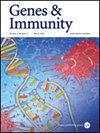Predictable regulation of gut microbiome in immunotherapeutic efficacy of gastric cancer
IF 4.5
3区 医学
Q1 GENETICS & HEREDITY
引用次数: 0
Abstract
Immunotherapy has showcased remarkable progress in the management of gastric cancer (GC), prompting the need to proactively identify and classify patients suitable for immunotherapy. Here, 30 patients were enrolled and stratified into three groups (PR, partial response; SD, stable disease; PD, progressive disease) based on efficacy assessment. 16S rRNA sequencing were performed to analyze the gut microbiome signature of patients at three timepoints. We found that immunotherapy interventions perturbed the gut microbiota of patients. Additionally, although differences at the enterotype level did not distinguish patients’ immunotherapy response, we identified 6, 7, and 19 species that were significantly enriched in PR, SD, and PD, respectively. Functional analysis showed that betalain biosynthesis and indole alkaloid biosynthesis were significantly different between the responders and non-responders. Furthermore, machine learning model utilizing only bacterial biomarkers accurately predicted immunotherapy efficacy with an Area Under the Curve (AUC) of 0.941. Notably, Akkermansia muciniphila and Dorea formicigenerans played a significant role in the classification of immunotherapy efficacy. In conclusion, our study reveals that gut microbiome signatures can be utilized as effective biomarkers for predicting the immunotherapy efficacy for GC.

肠道微生物组对胃癌免疫治疗疗效的可预测调节。
免疫疗法在治疗胃癌(GC)方面取得了令人瞩目的进展,这促使人们需要主动识别适合接受免疫疗法的患者并对其进行分类。本文纳入了30名患者,并根据疗效评估将其分为三组(PR,部分应答;SD,病情稳定;PD,病情进展)。我们进行了 16S rRNA 测序,分析了患者在三个时间点的肠道微生物组特征。我们发现,免疫疗法干预会扰乱患者的肠道微生物群。此外,虽然肠型水平的差异并不能区分患者的免疫治疗反应,但我们发现在 PR、SD 和 PD 中分别有 6、7 和 19 个物种显著富集。功能分析显示,应答者和非应答者的甜菜碱生物合成和吲哚生物碱生物合成存在明显差异。此外,仅利用细菌生物标记物的机器学习模型能准确预测免疫疗法的疗效,其曲线下面积(AUC)为0.941。值得注意的是,Akkermansia muciniphila 和 Dorea formicigenerans 在免疫疗法疗效分类中发挥了重要作用。总之,我们的研究揭示了肠道微生物组特征可作为预测 GC 免疫疗法疗效的有效生物标志物。
本文章由计算机程序翻译,如有差异,请以英文原文为准。
求助全文
约1分钟内获得全文
求助全文
来源期刊

Genes and immunity
医学-免疫学
CiteScore
8.90
自引率
4.00%
发文量
28
审稿时长
6-12 weeks
期刊介绍:
Genes & Immunity emphasizes studies investigating how genetic, genomic and functional variations affect immune cells and the immune system, and associated processes in the regulation of health and disease. It further highlights articles on the transcriptional and posttranslational control of gene products involved in signaling pathways regulating immune cells, and protective and destructive immune responses.
 求助内容:
求助内容: 应助结果提醒方式:
应助结果提醒方式:


